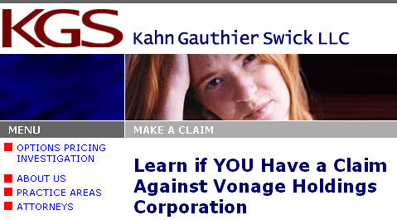Kahn Gauthier Swick Vonage suit: fee-hungry underwriters, unsuitable stock


Once again, I am not a securities attorney, nor an attorney of any kind.
But part of my work involves watching Vonage very closely, and reporting on all aspects of the company. I'm also a Vonage customer.
From these multiple perspectives I will now take a look at the Kahn Gauthier Swick filing, which alleges that "Company (Vonage) insiders, desperate to execute an exit strategy for themselves, embarked on an illegal course of conduct to sell shares of the Company in a public market."
As provided on the Kahn Gauthier website, a summary of the complaint offers these points with regard to the Vonage IPO, Directed Share Program, and information contained (or, allegedly not contained) in the Vonage prospectus:
The Complaint further alleges that, Defendants, realizing that institutional investors who normally buy in IPOs would be reluctant at best to purchase Vonage shares as-priced, pre-sold at least 13.5% of the Company's IPO shares to Company customers in violation of NASD Rule 2310. NASD Rule 2310 requires that a company recommending the purchase or sale of its securities to a customer must have a reasonable basis for believing that the recommendation is suitable for the customer. The Complaint also alleges Defendants had no such reasonable basis in this case and improperly crammed investors into the Vonage IPO regardless of their suitability.
The Complaint also contends that the Underwriter Defendants violated the securities laws because they allowed this illegal and improper action to continue. The Underwriter Defendants, the Plaintiff claims, had an obligation to ensure that Vonage had complied with NASD Rule 2310 in setting up and administering the accounts of customers purchasing in the IPO. According to the Complaint, however, the Underwriter Defendants had little or no incentive to ensure that customer participants in the IPO were suitable. Instead, the Complaint also alleges they were motivated by the tens of millions of dollars in fees they would receive from a successful IPO. Furthermore, according to the Complaint, Vonage had agreed to indemnify the Underwriter Defendants against certain liabilities relating to the customer pre-sale program; among those liabilities was the foreseeable possibility that customers who purchased in the IPO would refuse or fail to pay for the common stock allocated to them in the pre-sale.
As a result of this alleged illegal conduct, shares of Vonage sold in the IPO declined more than 30% in the first seven trading days. The decline in value of these shares has been substantially exacerbated by many Vonage customers who participated in the pre-sale now refusing to pay for their shares.
Now, I will tell you what I think.
It appears to me that what this suit is saying is that Vonage executives and the IPO's underwriters did not really believe in their heart of hearts that the IPO and subsequent Vonage share performance was going to be successful, and instead saw the promise of fees from Vonage customers who somehow found it an irresistible temptation to buy in.
I envision myself as a jury member who would want to know from the experts whether or not the language in the prospectus that pointed to the risk factors associated with this IPO were in fact, a definitive enough declaration of the liabilities and risks inherent with participation in the Directed Share Program and the IPO itself.
This filing also makes note of the steep decline in Vonage' stock price over the first seven days of trading. I should point out, though, that although Vonage's stock price is in fact, down 30% from the IPO level, it has appeared to have relatively stabilized in the last three or four days. I would wonder how long this relative stabilization would need to prevail before it tends to render the sharp initial trading drop an outdated- if admittedly unpleasant artifact.
There's also been a substantial lessening of trading volume in recent days- which may or may not indicate a gathering assumption on the part of investors that the most prudent strategy would be a "wait-and-see" approach about whether or not to hold on to the stock.
I'd also want some more specifics about how many Vonage members "refuse to pay for their shares." Two questions here:
a) in legal terms is there a difference between "refuse to pay" and "threaten to refuse to pay," or even "asking if they have to pay," as say, indicated on a forum post? and:
b), what are the percentage parameters that accurately apply to the descriptor, "many?" What percentage would "many" need to be out of all IPO participants to quantify a substantial number of shareholders who feel they have been wronged and are going to resist payment for shares based on that perceived wrong?
One thing's for certain, though. As sure as the sun rose this morning, there will be more class action suits against the Vonage IPO.